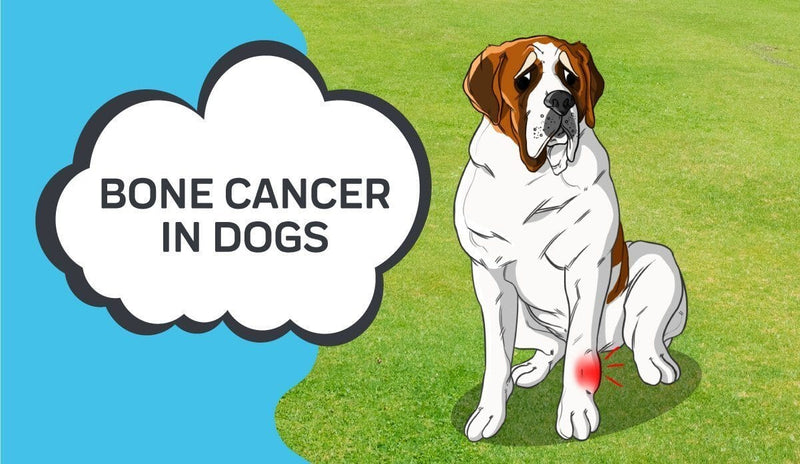- What is the Pancreas?
- Symptoms of Pancreatic Cancer In Dogs
- How Pancreatic Cancer is Diagnosed
- How to Treat Canine Pancreatic Cancer
- How Long Can a Dog Live with Pancreatic Adenocarcinomas?
- The Bottom Line
Unfortunately, just like humans, dogs of all sizes and breeds are at risk for developing cancer at some point in their lives. Cancer is a disease in which tumors grow within the internal organs or elsewhere in the body, and can be fatal.

In this guide, we’ll explain what this disease does and help you understand how the pancreas works. From there, we’ll dive into a discussion on the symptoms of pancreatic cancer in dogs, followed by the ways in which pancreatic tumors (also sometimes called adenocarcinomas) are diagnosed and treated. We’ll share tips on how to help manage your dog’s pain, and how they might react to treatment. There are several different types of cancers that dogs can suffer from, one of which is pancreatic cancer. Although it is a rare type of cancer in animals, it is serious, so it’s important to know the signs and symptoms of this disease. That way, if your dog does become ill, you and your vet can catch it early and give your dog the best chance of survival.
If you’re a dog owner, or your dog has recently been diagnosed with the disease, keep reading to learn about this condition and what can be done to help.
What is the Pancreas?
Just like humans, the anatomy of dogs is inclusive of an internal organ known as the pancreas. Located close to the abdominal region of dogs, the pancreas is right next to your dog's stomach, as well as the bile duct. In tandem with the bile duct, the canine pancreas is heavily involved in the digestive enzyme production of your dog's digestive tract. Without the pancreas working properly, dogs wouldn't be able to break down certain foods, and stomach ailments can occur. That’s why you should look out for changes in your dog’s eating and toilet routine, which can signal a problem.
The digestive enzymes produced by the pancreas make their way out of the organ and into the small intestine, at which point they move into the bloodstream via the lymph nodes. So, not only is the pancreas involved in functions locally but it also produces substances that are used by more distant parts of the body, from lymph nodes to the blood that circulates throughout all organs.
As well as its role in the digestive system, the pancreas plays a vital part in insulin production. This hormone regulates glucose levels in the bloodstream. Without insulin, blood sugar levels cannot be regulated and the metabolic processes of glucose can’t be monitored properly either. Improper regulation of glucose in the blood can result in diabetes, fainting, and seizures. Without insulin, your dog's blood sugar levels cannot be regulated and the metabolic processes of glucose can’t be monitored. If not properly regulated, diabetes could occur which includes fainting or seizures as a side effect for dogs without this vital function.
If your dog has started fainting or has recurrent attacks of diarrhea, it’s important to pay attention to these symptoms and take them to the vet. Alongside these, there are several other symptoms associated with this disease, which we’ll discuss below.
Symptoms of Pancreatic Cancer In Dogs
The only official way to receive a cancer diagnosis for your dog is by taking your canine companion to the veterinarian. Once your dog is seen by canine cancer professionals, a conclusion will be reached and you'll know what steps to take next in an effort to help your dog feel more like their old self.
But unless you just so happen to have an upcoming appointment and the vet spots early clinical signs of pancreatic cancer in dogs, cancer won't be detected on its own. It's up to dog owners to know what to look out for so that they can be proactive about their dog's overall health.
Even if you are not concerned that your dog might be unwell, it's still incredibly important to know about the signs of pancreatic cancer in dogs. This way, you're more likely to spot the signs and catch any problem in its early stages, rather than dismissing them as a passing illness and lowering your dog's chance of recovery in the process.
The below signs and symptoms are not exclusive to pancreatic cancer in dogs, but if your dog displays any of these, be sure to take them to the vet to be checked out.
- Changes in their consumption of food or water
- Loss of appetite
- Significant weight loss
- Abdominal pain or sensitivity
- Abdominal distention (swollen tummy)
- Moderate to severe fever
- Limping and wobbling
- No interest in activities they usually enjoy
- Anxiety or heightened stress levels
- Uncoordinated movements
- Seizures or fainting spells (can be caused by low blood sugar)
- Tremors and spasms
- Low moods
- Little to no energy
- Weakness
- Vomiting
- Diarrhea
- Discoloration of the skin
- Worsening signs of jaundice
How Pancreatic Cancer is Diagnosed
As demonstrated above, the symptoms of this disease in pets are very generic - they could belong to a number of different ailments. That’s why it’s important to take your dog to the vet if they show any of these signs, from weight loss to just acting unlike themselves, so that the professionals can conduct further investigation into why your dog is ill. From there, tests can be done to determine the root of the problem.

Tests for canine pancreatic cancer can include:
- Blood work
- Glucose level exams
- Test for hypoglycemia
- Abdominal ultrasound
- Analysis of possible AIGR
- Diagnostic imaging processes
- Biopsies
The results from these tests will be able to show the problem with your pup. If the diagnosis comes back as pancreatic adenocarcinomas, your vet will inform you of the best route to take for treatment and care.
How to Treat Canine Pancreatic Cancer
A canine pancreatic cancer diagnosis requires immediate care from canine cancer specialists. Once your dog receives a diagnosis of tumors in the pancreas, the veterinarians treating your pet will compile a treatment plan that they believe is most fitting for your dog's situation.

Some examples of treatment options include:
- Partial or total surgical removal of pancreatic tumor
- Surgical removal of an entire pancreas
- Chemotherapy following surgery
- Radiation therapy as a secondary treatment option
- Prescription pain medication such as NSAIDs (nonsteroidal anti-inflammatory drugs)
Since this form of cancer is severe, so are the treatment options. Surgery, chemotherapy, and radiotherapy are tough for humans to go through, let alone dogs. They won’t feel like themselves for a little while, although bear in mind that if your vet thinks these treatments are a good idea, it means they think your pet will respond well to them and that they have a good chance of survival and recovery.
In addition to surgical and medical care, pet owners can opt to use CBD oil for dogs with pancreatic cancer. To be 100% clear, CBD oil cannot treat cancerous tumors in the pancreas of dogs, but it is found to help ease pain and reduce stress and anxiety, helping your pet relax and manage their symptoms. Chat to your vet about using CBD oil for your pet if you believe this could be of help to them.
How Long Can a Dog Live with Pancreatic Adenocarcinomas?
Since the pancreas plays such an important and irreplaceable role in the body, the prognosis for pets with this condition is sadly low, especially if the cancer is advanced when it’s found. After a diagnosis, the median life expectancy for a dog who has had a tumor or pancreas removal surgery is two years, while medical treatment alone is six months. Sole medical treatment is usually offered when the disease is too advanced to operate on.
Of course, if they have surgery to entirely remove the pancreas, your dog will need lifelong care to manage the effect this would have on their body, such as insulin injections and other hormone therapies.
Some dogs whose cancer is caught early can make a full recovery and enter remission for pancreatic adenocarcinomas - so if your pet has received an early-stage diagnosis, don’t lose hope. If the prognosis is poor, the best you can do is make your dog comfortable and help them enjoy the end of their life. Your vet will equip your pet with a pain management plan which can include prescribed drugs and supplements like CBD oil, and of course, a lot of treats.
The Bottom Line
As always, we urge you to confide in your veterinarian and ask for insight regarding your dog’s specific situation if you are at all worried.
If your pet has been diagnosed with an illness, don’t automatically assume the worst - but if they are ill, don’t lose hope. Your vet will do everything possible in the best interest of your beloved pet. All dogs are different, and the answer to the question of how long your dog might live is hard to answer. Regardless of how long they might live, focus on making your dog feel loved.
Sources:
Signs of Pancreatic Cancer in Dogs
Pancreatic Cancer (Adenocarcinoma) in Dogs
Pancreatic Cancer (Insulinoma) in Dogs
How long can a dog live with pancreatic cancer?
Approved by:
Dr. Ivana Vukasinovic
Doctor of Veterinary Medicine, University of Belgrade
Ivana Vukasinovic grew up in Serbia and attended the University of Belgrade where she received a degree in Veterinary medicine in 2012 and later completed surgical residency working mostly with livestock. Her first year of practice was split between busy small animal practice and emergency clinic, and after two more years of treating many different species of animals, she opened her own veterinary pharmacy where an interest in canine and feline nutrition emerged with an accent on fighting animal obesity. In her free time, she acts as a foster parent for stray animals before their adoption, likes to read SF books and making salted caramel cookies.
Thanks for stopping by!
P.S. We Love You!Sincerely,
The Innovet Team
Please do not ask for emergency or specific medical questions about your pets in the comments. Innovet Pet Products is unable to provide you with specific medical advice or counseling. A detailed physical exam, patient history, and an established veterinarian are required to provide specific medical advice. If you are worried that your pet requires emergency attention or if you have specific medical questions related to your pet’s current or chronic health conditions, please contact or visit your local/preferred veterinarian, an animal-specific poison control hotline, or your local emergency veterinary care center.
Please share your experiences and stories, your opinions and feedback about this blog, or what you've learned that you'd like to share with others.













 Ivana Vukasinovic grew up in Serbia and attended the University of Belgrade where she received a degree in Veterinary medicine in 2012 and later completed surgical residency working mostly with livestock. Her first year of practice was split between busy small animal practice and emergency clinic, and after two more years of treating many different species of animals, she opened her own veterinary pharmacy where an interest in canine and feline nutrition emerged with an accent on fighting animal obesity. In her free time, she acts as a foster parent for stray animals before their adoption, likes to read SF books and making salted caramel cookies.
Ivana Vukasinovic grew up in Serbia and attended the University of Belgrade where she received a degree in Veterinary medicine in 2012 and later completed surgical residency working mostly with livestock. Her first year of practice was split between busy small animal practice and emergency clinic, and after two more years of treating many different species of animals, she opened her own veterinary pharmacy where an interest in canine and feline nutrition emerged with an accent on fighting animal obesity. In her free time, she acts as a foster parent for stray animals before their adoption, likes to read SF books and making salted caramel cookies.




